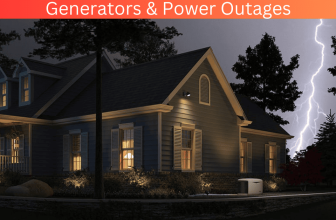
Life can throw surprises our way when we least expect them. Being ready with an emergency kit can make all the difference between being safe and being helpless during such situations as natural calamities or power outages- which have been known to happen without warning.
A vital item that should undoubtedly feature in such kits is a portable generator.
With its many benefits, like providing light and electricity during emergencies, neglecting this essential tool would be unwise -it could mean disaster! This article will explain why incorporating a portable generator into your emergency supply kit matters and suggest tips on what you should consider while buying one based on your requirements.
Benefits Of Having A Portable Generator
Amidst emergencies, having a portable generator in your supply kit proves incredibly useful. It facilitates keeping essential electronics powered while providing light and even cooking capabilities. A properly set up unit enables warmth retention during harsh weather conditions – a feature that has granted me tremendous peace of mind.
The size of the gadget is an essential element to consider when choosing one for yourself. You want a device that conveniently fits into your kit while still supplying enough energy to operate planned devices seamlessly.
Another crucial factor is fuel consumption and noise levels – as these could determine whether or not the device provides adequate service under different circumstances.
While most quality portable generators may come at steep prices – they’re typically worth investing in if they offer consistent and dependable functioning during emergencies. “No man is an island” as famously stated by John Donne.
This quote rings true for us as consumers when making buying decisions. Consumer who seeks to make wise purchases must involve themselves in research – exploring various models and comparing price ranges will always lead them towards making better choices with regard to getting the best value for their money.
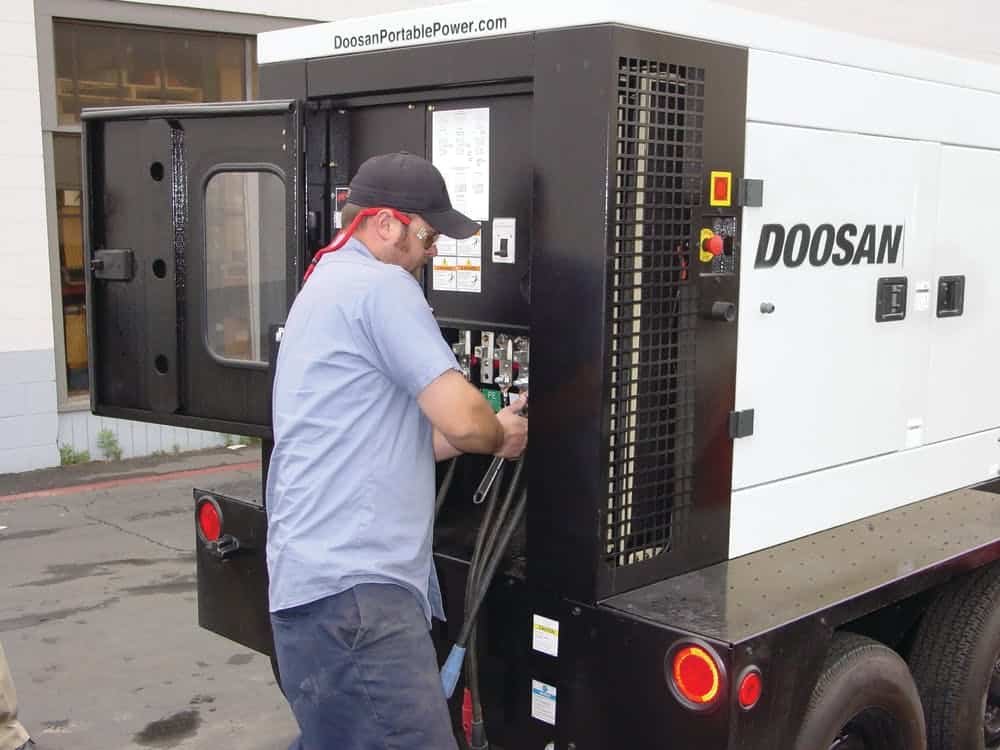
Image Credit: for construction pros
Factors To Consider When Choosing A Generator
When push comes to shove during an emergency situation having the right generator on hand could make all the difference between survival or being left out in the cold (quite literally). That said, choosing which generator suits your needs best can be daunting. Here are some key factors worth weighing up:
Size plays a crucial role in determining whether or not your chosen generator will prove sufficient during an emergency event.
Choosing one that can’t handle all your critical appliances and electronics would defeat the purpose! Be sure to calculate how much wattage might be required ahead of time.
Fuel type is another significant consideration when selecting a generator that meets all your needs.
While gasoline may seem like the obvious go-to option due to its widespread availability and convenience it has a shorter shelf life than other fuel types and can go bad with time. Propane is more expensive but boasts an extended shelf life – although it may be harder to source in certain regions.
A reliable generator can make all the difference during an emergency, but with so many options available, selecting the right one can be daunting. It’s important to weigh factors such as fuel type and cost – while diesel may have a longer lifespan than propane and could potentially be less expensive depending on where you live, diesel generators often come with heftier upfront costs compared to their gas or propane counterparts. Safety should also be top of mind when choosing a generator for your home or business.
Be sure to select models that are safe for enclosed spaces like garages or basements during emergency situations where evacuation isn’t possible. Additional safety features like automatic shut-off switches and low noise levels can provide extra peace of mind.
By considering these factors carefully you'll be able to confidently select a portable generator thats capable of powering your needs during times of crisis. Lets take a closer look at the various types of generators on the market to help you make an informed decision.
Image Credit: home depot
Types Of Portable Generators
You never know when an emergency might strike, but you can be prepared with the right survival gear. Portable generators are a crucial part of any emergency kit providing the power you’ll need to stay safe and connected in times of crisis.
However, with so many options on the market, it’s tough to choose which generator is best suited for your needs. That’s why I’ve compiled a comparison table of some of the most popular types of portable generators available today.
Here is what you need to know:
-Inverter Generator: These models are perfect for camping trips or powering smaller electronics like laptops and phones. They’re fuel-efficient and lightweight, making them easy to transport. -Dual Fuel Generator: This type of generator uses both gas and propane fuel sources, giving you flexibility depending on what’s available.
They’re especially handy during extended power outages as they have a longer run time than other models.
-Standby Generator: If you’re looking for a backup power source for your home during an outage, standby generators are the way to go. They’re designed to keep your lights on and appliances running until regular power is restored.
Remember – when it comes to survival gear – it’s always better safe than sorry! A reliable source of power during emergency scenarios or camping trips can be provided by owning a quality portable generator.
When choosing one for your specific needs there are several things that should be considered. Traditional portable generators offer high wattage output but tend to weigh more and emit more noise than other models, such as inverters.
Before making your final decision regarding which model fits best into your budget and lifestyle requirements some factors such as size, fuel type and runtime should also be taken into account.
An alternative option worth exploring is a natural gas or propane-operated unit – this eliminates concerns surrounding tank refill requirements.
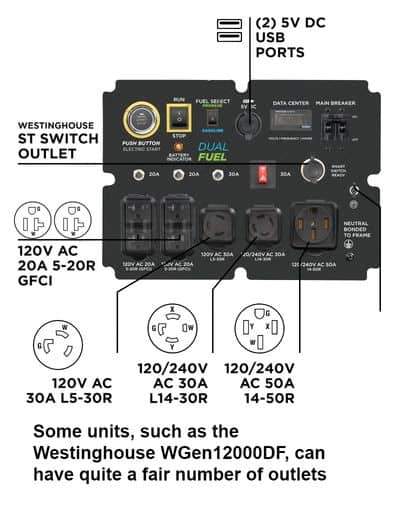
Image Credit: getwiredusa
Understanding Generator Power
When a crisis occurs, having backup power sources like a portable generator becomes paramount to the survival and protection of property. Being well-informed about your generator machine means knowing what type or model suits your requirements best and how its energy works.
The most crucial factor is determining the wattage necessary for running all appliances and electronics during an emergency situation like blackouts etc. To do this calculation effectively, consider each device individually and then assess each device’s wattage requirement; if the total surpasses what your chosen unit offers, it won’t work optimally; conversely, if certain devices draw more electricity than others connected within their output range, then some may stop functioning – possibly causing harm due to overloading circuits etc.!
Make sure that before using any portable energy source, you have fuel compatibility options available in your location so that it is not a wasted resource; otherwise, in a time of crisis or emergency, you could find yourself with energy needs unmet and problems multiplied. Lastly, let’s dive into our final section: fuel varieties for portable generators!
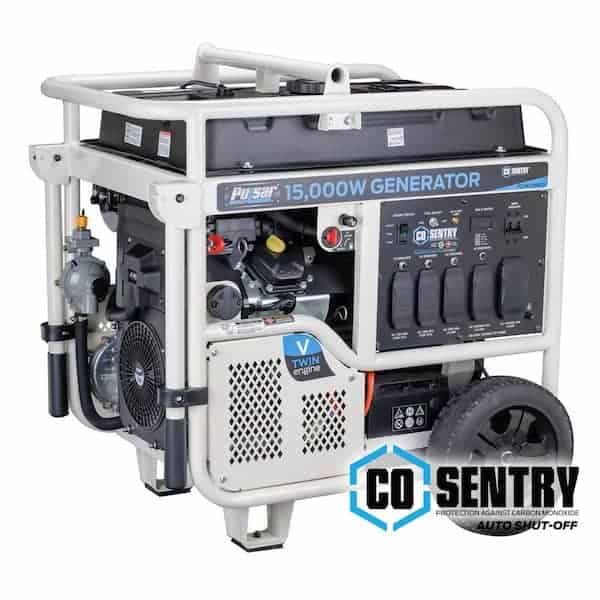
Image Credit: home depot
Fuel Options For Portable Generators
As a portable generator owner understanding your fuel options is essential.
There are three primary sources of fuel to power your generator: gasoline, propane and diesel. Each of these has its own benefits and drawbacks that you should take into account before selecting the best one for your needs.
For a quick comparison of features, we’ve prepared a table that highlights the key pros and cons of each option:
| Fuel Source | Pros | Cons |
|---|---|---|
| Gas | – Easily accessible – Affordable – Easy to use and transport | – Generates carbon monoxide – Shelf life of gasoline requires proper storage |
| Propane | – Non-toxic – Has an indefinite storage lifespan – Clean burning with no carbon monoxide emissions | – More expensive compared to gasoline – Harder to find in some areas – Limited ability (up to 5 KW only) |
| Diesel | – More efficient than gasoline – Cheaper than propane – No need for stabilizing agents required – Less flammable compared to gas or propane fuels | – Generates more noise compared to other fuels – Can be hard to find in some areas. – Hazardous fumes can be generated if not maintained properly |
Factors such as cost, availability, environmental impact, ease of use and safety are all worth considering when you’re making a decision about which fuel source is right for you. Discovering a suitable fuel source for your specific necessities is only half of what’s required; becoming well-versed in safe operational procedures is key. In this subsequent section, we will delve into pivotal generator safety recommendations – knowledge that could be instrumental in saving lives!

Image Credit: ltgenerators
Generator Safety Tips
No matter what kind of disaster strikes, being prepared with a portable generator can make all the difference in keeping your electricity running smoothly. However, it’s important to remember that they pose risks, too, and should be used carefully.
Here are some quick safety tips for using your portable generator:
Read through the manual before starting up; never skip instructions!
To minimize the risk of fire or shock hazards – check all connections carefully; use only outdoor-rated extension cords.
Don’t overlook where you position your generator! Carbon monoxide from the exhaust gas is harmful if breathed in – always outside & away from doors/windows/vents!
Adhere strictly to recommended wattage limits provided by the instruction manual so as not to exceed maximum output during use. Take care & be safe! When it comes to owning a portable generator there can be no compromise on safety and functionality. Guarantee regular maintenance according to the manufacturer’s specifications is key.
Don’t take any chances – prioritize your generator care today!
Maintaining Your Portable Generator
The convenience offered by a portable generator can be unmatched during blackouts or outdoor adventures – but only if it’s well-maintained! Neglecting regular maintenance checks could lead to malfunctioning fuel lines, dead batteries, engine damage…the list goes on. Keep things running smoothly by performing these activities at recommended intervals:
Start by inspecting for loose fasteners and damaged parts on a monthly basis – prevention is the best cure! Keep oil levels topped up, adding more as needed either every month or after every 25 hours of use.
Changing the oil and filter at least once a year or after every 100 hours of usage is essential to prevent the build-up of harmful contaminants. Finally, keep your cooling fins and air filter element(s) clean by giving them a good scrub either seasonally or after 100 hours of operation. Maintaining a portable generator requires attention to detail – specifically with regard to
following recommended maintenance procedures from the manufacturer. These guidelines advise oil and filter replacements at set intervals (such as after using for approximately one hundred hours or once yearly – whichever arrives first). Remember also that regular upkeep, like cleaning cooling fins and air filter element(s), should be conducted seasonally or every hundred hours of use.
Finally, let’s delve into the proper storage techniques to keep your generator in top condition while not in operation.

Image Credit: palmbeachpost
Storing Your Portable Generator
When you have a portable generator on hand, being prepared can make all the difference in an emergency situation. That goes beyond just having one ready – proper storage and maintenance are also crucial factors. Follow these tips for safely storing your portable generator.
For starters make sure that you're always using clean fuel in your generator. Using old or contaminated fuel could damage the engine significantly over time. Store fresh gas in an airtight container and aim to use it within two months of purchase.
Another key consideration is protecting your generator from extreme temperatures or moisture. Avoid storing the unit somewhere too hot or too cold since this could cause damage over time. Additionally try to keep the unit dry by protecting it from rain or snow. Lastly, don’t forget to inspect your generator regularly for any signs of wear or damage before using it. This simple step can help ensure that your unit stays in top condition and is always up to the task when you need it most.
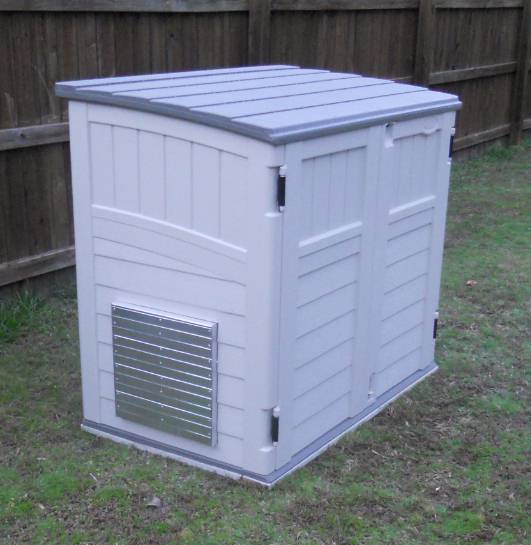
Image Credit: no outage
Essential Accessories For A Portable Generator
Now that you’ve safely stored your portable generator, consider adding some essential accessories that offer maximum performance. These must-haves include power cords and transfer switches.
A power cord is what connects your generator with an outlet or appliance, so choosing one with enough wattage and sturdy construction appropriate for outdoor use is vital. If you plan on using your generator as a primary source of electricity, invest in a transfer switch.
This indispensable device allows swift switching between different power sources without manual plugging or unplugging of appliances – particularly useful during emergencies where speed is necessary.
These are just the fundamentals when it comes to enhancing your setup, but additional accessories can offer more convenience and reliability if desired. In our next section, we’ll examine some cost-effective solutions as alternatives to portable generators!

Image Credit: zoeticequipment
Cost-Effective Alternatives To Portable Generators
Emergencies can hit at any time – making preparation all the more critical when it comes to powering up our essentials like lights and communication devices; this is where portable generators come in handy.
However, buying them outright may not be feasible for everyone due to their high cost. Nevertheless, many reliable, low-cost alternatives exist as well, which one should consider investing in along with other survival gear, such as solar panels that can generate power ranging from $0 up to $2k+ depending on different types and sizes from simple setups for small homes or large scale commercial installations.
One downside of relying on solar power is its dependence on sunlight availability which may pose an issue during critical times. Nevertheless, there are other options worth considering – wind turbines can be an excellent source of electricity in areas with high winds although their initial cost might be higher compared to solar panels.
Over time though, wind turbines prove economical since they have lower maintenance costs and do not require fuel expenses as opposed to traditional generators. For those on a budget, hand crank generators are a practical solution that requires no electricity, only human effort. However, one must always have the right tools and supplies to be prepared in case of an emergency or power outage.
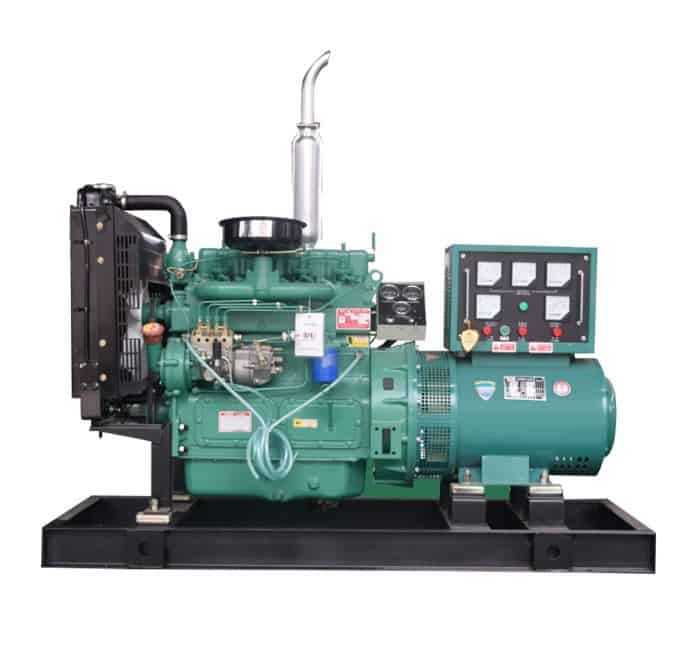
Image Credit: Alibaba
Frequently Asked Questions
How Long Does A Portable Generator Typically Last?
Assembling an effective emergency supply kit that includes a reliable source of power like a portable generator can mean all the difference when calamity strikes—especially when utility companies are unable or unwilling to provide electricity services at crucial moments when people most need them.
As you prepare your emergency kit, its important to understand the capabilities of your portable generator. For example, most units can operate around 8 to 10 hours on a full tank of gas, depending on the size and load of the generator in use. However, bear in mind that there may be variations from model to model based on its technical specifications. For personalized insight into what you can expect from your particular unit, it’s worth reviewing individual product details before making any purchase or investment.
Are Portable Generators Easy To Transport?
If portability is what you’re after in a generator then look no further than the trusty portable variety.
These versatile machines are generally quite lightweight – typically anywhere from 25 to 200 pounds – and feature wheels that make transporting them an absolute cinch.
Many also boast handles to increase their manoeuvrability even further. So if ease of movement is important to you when selecting which type of generator to buy then it makes perfect sense to opt for one thats designed specifically with portability in mind.
Are There Any Specific Regulations For Using A Portable Generator In My Area?
Thinking about breaking out that portable generator?
Before doing so, make sure you’re not running afoul of any regional regulations or ordinances regarding usage. In certain areas around the country, these regulations can restrict when and how generators are utilized – so do yourself a favour and double-check with local authorities before flipping switches! Furthermore, remember that some states demand permits for generator usage.
To skip any headaches, investigate whether your state is among them and what steps you’ll need to take.
What Is The Best Type Of Portable Generator For My Needs?
When considering purchasing a portable generator, its imperative that a number of key factors are taken into account to ensure that it fits one’s individual needs perfectly.
One such factor is determining exactly how much power output is required – this will impact the choice of fuel source significantly, as well as determine whether a smaller gasoline-powered unit would suffice or if diesel or propane options ought to be considered instead due to their higher energy efficiency ratings and longer run times respectively.
This is apart from factoring in local regulations concerning noise levels and other restrictions that might influence the user’s decision-making when selecting a portable generator.
Are There Any Additional Safety Measures I Should Take When Using A Portable Generator?
While convenient during power outages, portable generators can pose significant hazards if not utilized safely – hence precautions are crucial! Keep these rules front of mind while operating: commence by stationing the gizmo at least 20 feet away from all structures nearby; next up?
Don’t let anyone operate a generator ‘inside’, nor ‘outside near open windows.’ Otherwise?
Exposure to carbon monoxide inside an enclosed space like garages & tool sheds can cause serious illness (or worse) within minutes! Finally, use only appropriate fuel types, be sure to follow instructions closely!
Conclusion
A portable generator is indispensable when it comes to emergency preparedness since it ensures an uninterrupted supply of electricity when the grid fails or becomes inaccessible due to natural disasters or crises.
These generators are lightweight and highly mobile, making them ideal for storage in disaster preparation kits.
With regular maintenance and correct storage practices implemented properly over time, these products can prove helpful over several years of use.
When using these generators, being aware of relevant local guidelines on operation along with appropriate safety precautions during use should be taken into account always for safe usage given their potential hazards if not used correctly.



